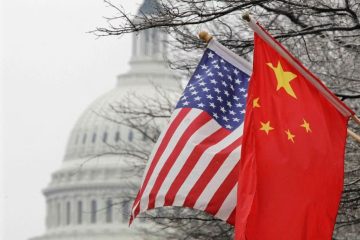Nvidia’s New China Pickle: Customers Don’t Want Its Downgraded Chips

After U.S. regulations barred Nvidia from selling its high-performance artificial-intelligence chips to China in October, the company’s engineers quickly designed a new lineup to comply with the tightened rules.
The U.S. tech company may have found some wiggle room, but it faces a bigger problem: Chinese cloud companies—some of Nvidia’s biggest customers globally—aren’t so keen on buying its lower-powered AI chips.
Alibaba Group and Tencent are among China’s biggest cloud companies that have been testing Nvidia samples since November. They have indicated to Nvidia that they would order far fewer chips from the company this year than they had originally planned to buy of its now-banned previous chips, people familiar with the matter said.
In the short term, Nvidia’s downgrading of its processors is narrowing the performance gap with local alternatives, making China-made chips increasingly attractive to buyers.
Alibaba and Tencent are shifting some advanced semiconductor orders to homegrown companies such as Huawei Technologies and relying more on chips they can develop in-house, the people said. So too are China’s other top two buyers—AI pioneer Baidu and TikTok owner ByteDance.
In the longer term, Chinese buyers are uncertain about Nvidia’s ability to continue to supply them, given U.S. regulators have pledged to review the chip-export controls regularly and could further tighten performance limits, the people said. Tech firms are modifying their business strategies to prepare for a future with less access to Nvidia’s products, and to avoid the costly process of constantly adjusting their technology to adapt to new chips.
For Santa Clara, Calif.-based Nvidia, threading the needle between the demands of U.S. regulators and supplying chips that Chinese clients need is getting more difficult. The company has billions of dollars of unfulfilled orders for its earlier chips, and China is one of its biggest markets, historically contributing about a fifth of its revenue.
Nvidia’s chips are currently in higher demand than it can meet. Nonetheless, geopolitical tensions pose the longer-term risk of lost sales in the world’s second-biggest economy, which is pursuing AI development as a strategic priority.
Chinese cloud companies currently source around 80% of high-end AI chips from Nvidia, and that is likely to decline to 50%-60% in the next five years, said Frank Kung, an analyst at tech-research firm TrendForce. He added that tightening U.S. chip controls in the future would create additional pressure on Nvidia’s China sales.
Nvidia said it is working to offer products that comply with U.S. rules to customers worldwide.Nvidia has said it doesn’t see a short-term financial impact from restrictions on shipment of its AI chips to China because it can find other buyers for them. But Chief Financial Officer Colette Kress said last year that in the long run, prohibiting the sale of AI chips in China would keep the U.S. industry from being able to compete and lead in one of the world’s largest markets.
Switching to Huawei Chips
Over the past two years, the Biden administration has imposed two rounds of export sanctions to curtail China’s access to advanced chips and technology that the U.S. says Beijing could use to advance its military and surveillance capabilities. Nvidia Chief Executive Jensen Huang has said he still hopes to supply high-end processors to China and is working with customers in China to get export licenses.
After the first curbs in October 2022, Nvidia modified the chips it sold in China by scaling back their performance to fall below the thresholds that would require U.S. government oversight. It sold more than $1 billion worth of such chips to Chinese customers in 2023.
When the U.S. a year later cut off more Nvidia chip exports to China without a license, the chip maker developed another new lineup of less powerful processors for Chinese buyers, which it plans to release early this year, The Wall Street Journal reported. Last month, Nvidia launched the GeForce RTX 4090 D, a modified version of its top-of-the-line gaming chip adapted after the latest U.S. curbs.
Chinese companies have been testing samples of Nvidia’s new highest-performing AI chip in the coming lineup, called the H20. The chip allows data to transmit among multiple processors efficiently, making it a better option than homegrown alternatives for building chip clusters needed to handle the computational workloads of AI, some testers said.
Still, testers said they needed more of the H20s to simulate the computing power that they got from Nvidia’s previous chips, increasing their costs.
The most advanced Chinese chips are as capable of handling inference—in which a trained AI model comes up with predictions—and less complex training tasks as are U.S. chips, developers say.
Huawei, acknowledged by Nvidia’s Huang to be a “formidable competitor” to the firm in China, is gaining ground at the expense of the U.S. chip maker.
In 2023, Huawei received orders for at least 5,000 Ascend 910B chips from major Chinese internet companies, people familiar with the matter said. The chip is considered the closest available Chinese alternative to Nvidia’s export-barred high-performance A100.
The chips are meant to be delivered through 2024, they said, as Huawei faces production constraints because of U.S. sanctions.
Chinese official procurements, such as those from state-owned telecom operators, have called for the adoption of homegrown chips such as Huawei’s. China Telecom acquired about $390 million worth of AI servers powered by Huawei chips in October, while China Unicom spent at least $20 million in 2022, according to company purchasing documents.
Huawei has stepped up efforts to expand its software ecosystem and plans to launch a new high-end AI chip as soon as the second half of 2024, the people said.
A few government-backed AI computing centers have sourced Huawei’s chips since the U.S. imposed curbs in 2022.
AI App Maker Skips Nvidia Chips
Alibaba’s chip arm, T-Head, is also developing a new specific-purpose AI processor under its Hanguang label, people familiar with the matter said.
“If the restrictions are likely to only get tighter in the next few years, you’d better start thinking about alternatives now,” said a senior executive at Alibaba Cloud.
The frenzy over generative AI earlier last year spurred demand for Nvidia’s advanced chips as major Chinese companies and startups tried to develop their own large language models. Now, many smaller players are scaling back such efforts and shifting to focus on AI applications.
Kenneth Yang, a Shanghai-based co-founder of a healthcare AI startup, said he plans to skip Nvidia’s latest China-focused chips and lease AI processing power from Baidu or Huawei instead.
“It’s about spending money in a smart way,” said Yang, who is developing a nursing-care app.
Engineers at Chinese technology companies say Nvidia’s chips will remain a purchasing priority over the next 12 months, given Nvidia’s more extensive product ecosystem and as local alternatives continue to be in short supply.
In the longer run, U.S. curbs are likely to push the Chinese to develop their own technologies, said Kevin Xu, founder of hedge fund Interconnected Capital, who authors a newsletter about tech and geopolitics.
“After this current phase of stockpiling is done, Nvidia’s China business will become a sacrificial lamb,” he said.










